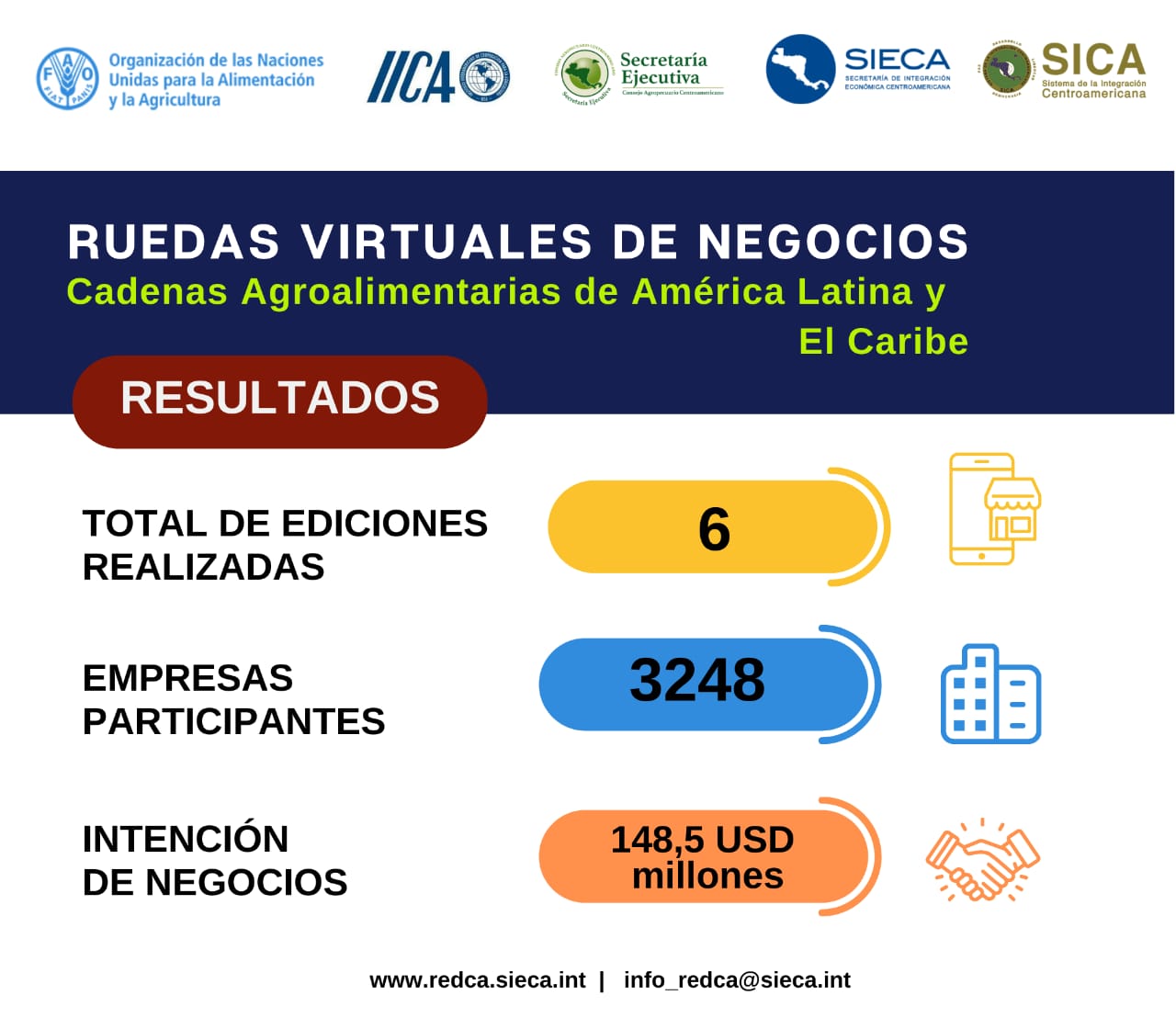Virtual business roundtables have promoted the sale of agrifood products and services from Central America and the Dominican Republic to the rest of the world.

San Jose, 15 March 2023 (IICA). Following six virtual business roundtables, the first of which was held in 2020, 3,248 businesses from Latin America and the Caribbean were able to set up appointments and sign letters of intent in the amount of USD 148 million.
The business roundtables were coordinated by the Secretariat for Central American Economic Integration (SIECA), the Executive Secretariat of the Central American Agricultural Council (SECAC), the Inter-American Institute for Cooperation on Agriculture (IICA) and the Food and Agriculture Organization of the United Nations (FAO).
Companies from the SICA region (Costa Rica, Guatemala, El Salvador, Honduras, Nicaragua, Panama and the Dominican Republic) and other Latin American countries, including Argentina, Bolivia, Brazil, Chile, Colombia, Dominica, Ecuador, Mexico, Paraguay, Peru, Saint Lucia, Trinidad and Tobago, Uruguay and Venezuela, participated in the roundtables, with buyers from China, the United States and Europe.
The joint initiative was conducted on the Central American Trade Network (CATN)—“a digital platform created and administered by SIECA that connects over 28,000 companies and is a powerful tool for business relations and networking to position products and services on the international market”, stated Edith Flores, Director of SIECA’s Center for Studies on Economic Integration (CEIE).
The sessions promoted the sale of agrifood products and services, including primary products and derivatives, processed foods, natural cotton fibers, production support and marketing services.
Specific subsectors that participated in the series of meetings over the last three years include fruit, vegetable, coffee, cocoa, basic grains, seeds, prepared foods, healthy snacks, packaging and distribution, transportation and logistics services.
Lucrecia Rodríguez, Executive Secretary of CAC, underscored the importance of this type of initiative in support of trade and the development of rural territories in the region given that the agricultural sector is the primary employment generator in rural areas and an important source of foreign exchange earnings. It is estimated that agricultural products represent approximately 45% of SICA exports.
“At a time when the agrifood sector has been affected by multiple crises related to COVID-19, adverse weather conditions impacting a number of countries in the region and the war in Ukraine, strengthening regional trade is key as it allows for a greater offering of food and products produced nearby to minimize the risk of food insecurity and promote productive chains that foster economic and social development”, commented Daniel Rodríguez, Manager of IICA’s International Trade and Regional Integration Program.
“In this framework, the Virtual Business Roundtables of the Agrifood Chains of Latin America and the Caribbean have become an important point of contact to strengthen business relations among the countries in the region”, he added.
Pablo Rabczuk, International Trade Coordinator at FAO for Latin America and the Caribbean, emphasized the commitment to continue supporting initiatives that bring small-scale producers, SMEs and family farming organizations closer to new markets, generating trade opportunities and positively impacting the region’s economic and social development.
“The virtual business roundtables along with training and technical assistance programs are key to providing these stakeholders with the tools they need to grow. This virtual business roundtable is an example of the importance of intraregional trade and of the capacities that exist in our region, and has been made possible in the framework of collaboration between SIECA, SECAC, IICA and FAO to strengthen fundamental support in the service of agrifood trade across the region”, commented Rabczuk.
This support of the region’s agricultural sector will continue into 2023 through the Central American Trade Network (CATN), which allows companies to consolidate and diversify their markets by closing distances and reducing costs since the virtual business meetings between companies can be held anywhere around the world using an Internet-connected mobile phone, tablet or computer.
More information:
Institutional Communication Division.
comunicacion.institucional@iica.int











